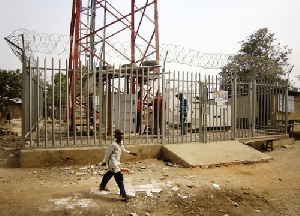…As operators fail to comply with fire safety standards
The recent fire outbreaks in various major markets across Ghana have brought a lot of concerns to the nation. Lives and properties are lost during these outbreaks.
It has therefore become imperative to many institutions in Ghana to re-examine their preparedness for any eventuality to beef up their equipment to fight fire outbreaks. However, it seems that many companies in Ghana operating telecom masts are not perturbed.
“The mast in my neighborhood runs on a generator and yet there is no fire equipment in the mast room. If this mast be engulfed in fire I will be affected” Eng. Alex K. Korsah a renowned telecom Engineer lamented in an interview.
He however argued that these tall masts which are sometimes found on top of buildings and public places may claim hundreds of innocent Ghanaians, destroying properties worth millions of dollars in case of any fire disaster.
“This makes me shiver because when a mast catches fire it is dangerous and it can equally fall on my house, I don’t know why responsible institutions are not checking these companies to comply with fire safety rules.
What breaks my heart is that these companies are able to provide expensive generators to power the masts so they don’t lose revenue when there is power outage but cannot provide simple basic safety equipment in case these generators catches fire, and Ghana Fire Service is watching them.
I have wondered why GNFS is not prosecuting these companies that are not fire safety compliant. If they are mandated then Ghanaians should take them on for allowing these Telecom Mast Operators put innocent lives in danger,” he said. Citing examples, Eng. Korsah accused many companies for operating telecom mast without complying with the safety standards of the nation.
He added that Ghana National Fire Service may be good in responding to fires, but what is the use of responding to fire if they cannot deal with companies and institutions which do not provide simple safety equipment.
Eng. Korsah further questioned: “Do these companies really take the lives of Ghanaians serious or capitalism does not care about human lives? Do they have fire certificates for operating these masts? If not, I wonder how they began operation without permit. It is only in Ghana these foreign companies can behave unprofessional, even in their own mother home they cannot operate without ensuring fire safety standards.
Meanwhile, the Public Relations Officer of Ghana National Fire Service (GNFS), Billy Anaglatey responding to these allegations confirmed that his outfit is working hard to get all companies and institutions fully comply with the laws of the land.
He however added that some companies must face the full rigors of the law to deter others from managing facilities by their own laws instead of following safety standards of the nation.
“We have been educating the general public on our LI. and the need to take Fire Safety Precautions seriously, even our men have been on the grounds inspecting commercial and domestic facilities and companies which do not comply we take them to court for necessary action,” he said.
Mr. Anaglatey stated that it is the sole responsibility of every Ghanaian and companies to provide basic safety equipment such as fire detectors, fire extinguishers being in commercial facility or domestic.
“Ghana National Fire Service will not rest and will close down such commercial places or take owners of such facilities to the court for the law to determine their punishment,” he added. Records at the National Communications Authority (NCA) show that as at January 2009, there were 3,000 cell sites in Ghana.
According to the NCA, MTN leads the pack with 1652, Tigo has 699, Vodafone with 378, while Airyel has 250 and Kasapa 112. Glo mobile recently received permits to erect towers in the country.
However there are sites that are shared by two or three telecommunication companies called Co-location and this has helped reduce the building of more masts in Ghana.
Members of the public have resisted the erection of telecom cell sites and masts in residential areas, citing health hazards from radio frequency radiations (RFR), noise and fumes from standby power generators, among other reasons.
The regulators and permit agencies, particularly NCA and the Environmental Protection Agency (EPA), have in the past called on the operators to voluntarily co-locate as a way of reducing the spread of telecom masts and thereby easing public anxiety.
Business News of Friday, 16 August 2013
Source: The New Crusading Guide
Telecom masts now death traps!
Entertainment












